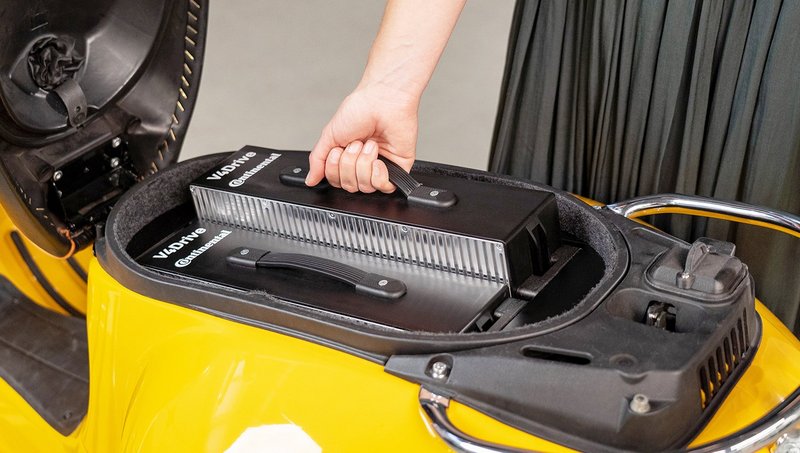Strong partnerships for electric mobility
Electric mobility requires joint efforts. For this reason, Continental relies on close collaboration for numerous developments.
As part of its partnership with battery specialist VARTA, it aims to develop new technologies and products for electric mobility. In an initial pilot project, the two companies started working on a replaceable 48-volt battery for electrically powered two-wheelers. The battery pack consists of a high-performance cell based on lithium-ion technology, which impresses with its high-performance, fast charging capability, low-temperature resistance and compact design. A specially developed battery management system from Continental now permits the use of this extremely high-performance battery cell in electric scooters. The battery pack enables a range of 50 kilometers and a drive power of 10 kW. It can also be easily detached from the two-wheeler and charged externally. Moreover, additional battery packs can be connected together and controlled through the advanced battery management system. The range of an electric scooter can thus be doubled to 100 kilometers by using two batteries.
Theelectrification of heavy goods transport is a further important piece of the puzzle for achieving a climate-friendly traffic system. To this end, Continental is working on an e-highway in cooperation with Siemens Mobility, a technology aimed at supplying hybrid, fuel-cell and battery-powered trucks with electricity via overhead cables throughout their entire journey. In addition to Germany, governments and public authorities in Great Britain and Sweden are also helping to develop the e-highway in Europe. The long-term objective is to build up an infrastructure that will, in addition to freeway sections, cover numerous heavily used routes between production sites and logistics hubs in order to significantly minimize the CO2 emissions of truck traffic. Equipping just the busiest 4,000 kilometers of Germany’s 13,000-kilometer highway network with the technology by 2030 would help tackle around two-thirds of the fuel consumption in domestic long-haul transport. This would reduce CO2 emissions by 10 to 12 million tons per year, provided the energy is generated from regenerative sources. The direct use of electrical energy from renewable energy sources enables low-cost transport and reduces dependence on fossil fuels. The technological principle of the e-highway is quite simple: the truck drives directly under the overhead cable, while sensors in the driver’s cab detect the power line. The current collectors of the so-called pantograph are then extended upward from the cab roof to the overhead cable, either automatically or at the press of a button. Pilot systems in Germany are being subsidized by the Federal Ministry of Transport and are currently being tested with hybrid trucks on three public test routes: the A5 federal highway in Hesse, the A1 in Schleswig-Holstein and the B462 federal road in Baden-Wuerttemberg. A new field test is set to follow shortly in Bavaria.
Back to overview "Into the Electric Future of Mobility with Continental".
Find out more about Electric Mobility at Continental.





